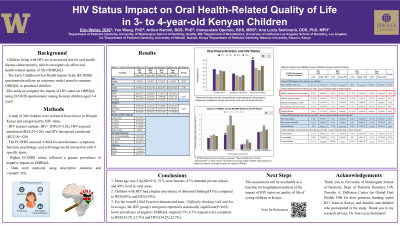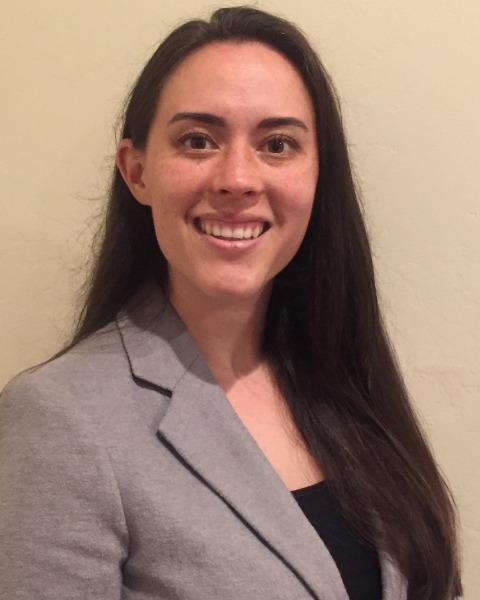Other
373 - HIV Status Impact on Oral Health-Related Quality of Life


Erin Welter, DDS (she/her/hers)
Pediatric Dental Resident
University of Washington, Seattle, WA
University of Washington, Pediatric Dental Residency Program
Seattle, Washington, United States- AS
Ana Lucia Seminario, DDS, PhD, MPH
Associate Professor, Pediatric Dentistry
University of Washington
Seattle, Washington, United States - TT
Thomas Tanbonliong, DDS
Program Director
University of Washington
Seattle, Washington, United States
Presenting Author(s)
Research Mentor(s)
Program Director(s)
Purpose: This study investigates the impact of HIV status on oral health-related quality of life (OHRQoL) in Kenyan children aged 3-4 years.
Methods: A total of 360 children were recruited from clinics and hospitals in West Kenya. Exclusion / inclusion criteria included medical clearance, residence in Kisumu County for 12 months post-enrollment, and parental-caregiver consent. Children were grouped by HIV status: HIV+ (HIV; N=120), HIV exposed uninfected (HEU; N=120), and unexposed uninfected (HUU; N=120). Caregivers evaluated OHRQoL through nine child-focused questions across four domains: symptoms, function, psychology, self-image / social interaction. Higher ECOHIS scores indicated greater negative impacts. Data were analyzed with descriptive statistics and t-tests (P < .05).
Results: Mean age was 3.4 years (SD=0.5); 51% were female, 47% attended private schools, and 49% lived in rural areas. Abnormal findings were most prevalent in the HIV group (81%) compared to HEU (60%) and HUU (54%). The HIV group had the lowest ECOHIS function domain score (15%) compared to HEU (24.2%) and HUU (34.2%) (P=.0058). Similarly, for “Difficulty drinking cold and hot beverages,” scores were lowest in the HIV group (8.3%) versus HEU (12.5%) and HUU (22.5%) (P=.0026).
Conclusion: While children living with HIV had significant prevalence of abnormal findings compared to HEU and HUU children, OHRQoL did not appear to be as impacted as in other groups. This assessment will be invaluable as a baseline for longitudinal analysis of the impact of HIV status on OHRQoL of young children in Kenya.
Identify Supporting Agency and Grant Number: Research supported by: University of Washington (Seattle,WA), University of California (Los Angeles, CA), University of Nairobi, Maseno University, Institutional Review Board (IRB) at the University of Washington (UW) (FWA #000006878) and Jaramogi Oginga Odinga Teaching and Referral Hospital Ethics Review Committee.

.jpg)